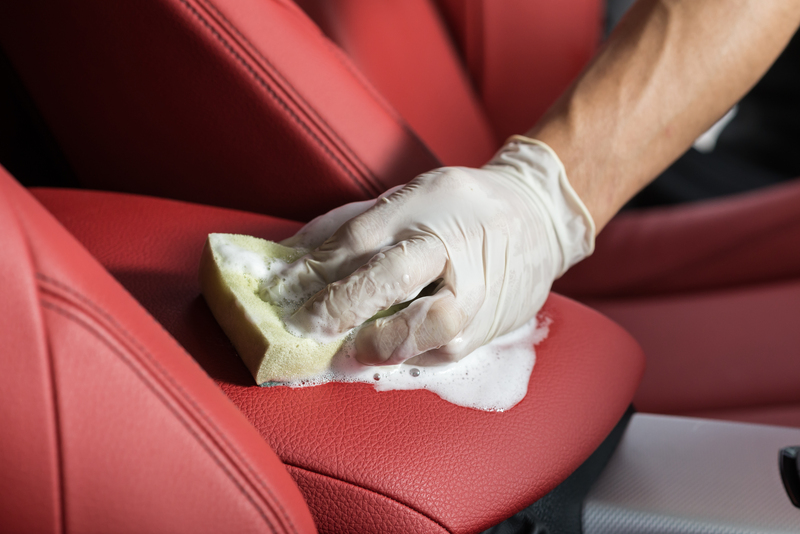Banish Damp Odors: Effective Methods Revealed
Posted on 05/10/2025
Banish Damp Odors: Effective Methods Revealed
Tired of musty, damp odors ruining the comfort of your home? You're not alone. Whether it's a stuffy basement smell, lingering bathroom humidity, or mildew in closets, damp odors are a persistent nuisance. But don't worry -- keeping your living environment fresh is easier than you think. In this comprehensive guide, we'll reveal effective methods to banish damp odors and enjoy a breath of fresh air at home.
Why Do Damp Odors Occur?
Before you can eliminate stubborn damp odors, understanding their causes is key. Typically, unpleasant musty smells arise from excess moisture, inadequate ventilation, or the presence of mold or mildew. Common culprits include:
- Leaky pipes or roofs
- Poor ventilation in bathrooms, kitchens, or basements
- Wet laundry left indoors
- Floods or spills not properly cleaned
- High indoor humidity levels
- Old carpets or upholstery
Identifying the source is the first step to banishing unwanted dampness and associated odors.

Signs That Your Home Has Damp Odors
Recognizing damp odors early can help you act swiftly. Look out for these signs:
- A persistent, musty smell, especially after rain
- Visible mold or mildew patches on walls or ceilings
- Condensation on windows
- Bubbling or peeling paint
- Warped wood or floorboards
- Unexplained stuffiness in certain rooms
If you notice any of these, it's time to banish those musty odors with proven solutions.
How to Banish Damp Odors: Step-by-Step Solutions
Ready to reclaim your fresh-smelling home? Here's how to eliminate damp odors effectively:
1. Locate and Fix All Sources of Moisture
- Inspect for leaks: Check under sinks, around windows, and in the basement for leaks or seepage.
- Repair and replace: Fix leaky pipes, replace worn seals on windows and doors, and patch any roof damage promptly.
- Check appliances: Washing machines, dishwashers, and showers can all be culprits for excess moisture.
Addressing water issues at the source is essential to preventing the recurrence of damp, musty odors.
2. Increase Airflow and Ventilation
- Open windows when weather permits to let in fresh air.
- Use exhaust fans in kitchens, bathrooms, and laundry areas.
- Install a whole-house ventilation system if feasible.
- Move furniture away from walls to allow air to circulate freely.
Improving ventilation is a highly effective method to banish damp odors naturally and prevent mold growth.
3. Use a Dehumidifier
- Run a dehumidifier in damp or humid areas, such as basements and bathrooms.
- Keep humidity levels below 60% (ideally around 50%) to discourage mold and mildew activity.
- Regularly empty and clean your dehumidifier to ensure optimal performance.
Reducing indoor humidity is crucial to eliminating musty smells at their source.
4. Utilize Natural Odor Absorbers
- Baking soda: Place bowls of baking soda in musty rooms or inside closets to absorb unpleasant odors.
- Activated charcoal: Charcoal bags or sachets are excellent at removing airborne moisture and odors.
- White vinegar: Set out bowls of vinegar (out of reach of pets and kids) to neutralize lingering smells.
- Essential oils: Add a few drops of tea tree, lavender, or eucalyptus oil to a diffuser for a fresh scent.
These methods offer a chemical-free solution for homes sensitive to fragrances or harsh cleaning products.
5. Deep Clean Problem Areas
-
Carpets and Rugs:
- Steam clean or shampoo carpets to remove embedded mold spores and odors.
- If persistent, consider professional deep cleaning or replacement.
-
Upholstery:
- Use a fabric-safe cleaner or steam to treat furniture and curtains.
-
Walls and Ceilings:
- Wipe down with a mixture of water, vinegar, and a few drops of dish soap.
- For stubborn mold, use a diluted bleach solution (always test a small patch first).
Regular cleaning and maintenance are vital for banishing musty odors and maintaining a hygienic environment.
6. Replace Air Filters Regularly
- Change HVAC and air purifier filters every 1-3 months as recommended.
- Dirty filters can harbor mold spores and redistribute musty smells throughout your home.
Clean air filters contribute to fresh indoor air and help in eliminating damp odors over time.
7. Consider Moisture-Absorbing Products
- Purchase silica gel packs for closets, drawers, or small storage spaces.
- Hang moisture-absorbing absorbers in wardrobes, under sinks, or behind furniture.
- Calcium chloride dehumidifiers are also effective for garages or crawl spaces.
Preventing Dampness and Musty Smells
As the saying goes, prevention is better than cure. Adopt these habits to stop damp odors before they start:
- Ensure gutters and downspouts direct water away from your home.
- Ventilate your bathroom after every shower or bath.
- Dry clothes outside or use a vented dryer to avoid adding extra moisture indoors.
- Use waterproof paint or sealants in basements and bathrooms.
- Store books, cardboard, or fabric in dry areas only.
- Inspect and service your HVAC system annually to ensure efficient moisture removal.
Natural Remedies Versus Chemical Solutions
When it comes to banishing persistent damp odors, both natural and chemical solutions are available.
Natural Remedies
- Less harsh on surfaces and safer for those with allergies or pets
- Baking soda, activated charcoal, vinegar, and essential oils are effective and environment-friendly
Chemical Solutions
- Bleach-based mold removers kill mold instantly and deodorize surfaces
- Commercial air fresheners mask odors but may not solve the underlying problem
The best approach? Use natural methods for day-to-day odor control and reserve chemicals for severe or persistent issues, especially where visible mold is involved.
When to Call a Professional
Sometimes, persistent damp odors signal deeper issues like structural leaks or widespread mold infestations. Call a professional if:
- Musty odors persist despite all your efforts
- You have health symptoms like allergies, headaches, or respiratory issues
- You find extensive black or green mold
- There's a history of flooding, water damage or the source of moisture is unclear
Professional remediation ensures safety and long-term odor elimination by addressing root causes.

Frequently Asked Questions (FAQ) About Damp Odors
Are musty odors harmful to health?
- Prolonged exposure to mold spores can trigger allergies, asthma, and other respiratory issues.
- Musty environments can also impact mental well-being due to discomfort and stress.
Will air fresheners remove damp odors?
- Air fresheners can mask odors but do not solve moisture problems or eliminate the source.
- For lasting results, tackle the cause with dehumidification and cleaning.
How often should I run a dehumidifier?
- In damp environments, running a dehumidifier daily may be necessary, especially during rainy or humid seasons.
- Monitor humidity with a hygrometer and adjust as needed to keep levels under control.
Conclusion: Banishing Damp Odors for Good
A home filled with fresh, clean air is within your reach. By following these effective methods, you can banish damp odors and create a more comfortable, healthier living space. Remember:
- Identify and fix sources of dampness promptly
- Increase ventilation and dehumidify when needed
- Clean thoroughly using natural or chemical solutions
- Practice preventative maintenance to keep musty smells at bay
Whether you're battling a single damp room or looking for whole-house freshness, these proactive odor removal techniques will help you say goodbye to mustiness forever. Share these tips with friends and family, and enjoy the invigorating atmosphere of a truly odor-free home!
Latest Posts
Banish Damp Odors: Effective Methods Revealed
Achieve Pristine, Streak-Free Glass Every Time
A Step-by-Step Guide to Pristine uPVC Window Frames
Transform Your Floors with Professional Carpet and Hardwood Cleaning




 Rug Cleaning
Rug Cleaning  Steam Carpet Cleaning London
Steam Carpet Cleaning London  Upholstery Cleaning Services
Upholstery Cleaning Services